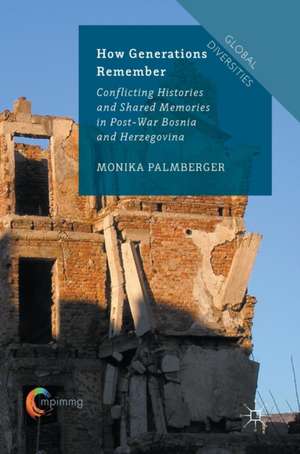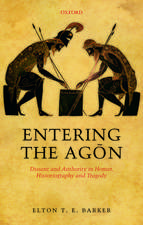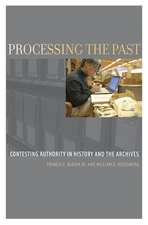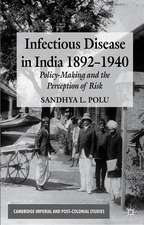How Generations Remember: Conflicting Histories and Shared Memories in Post-War Bosnia and Herzegovina: Global Diversities
Autor Monika Palmbergeren Limba Engleză Hardback – 19 dec 2016
This book is open access under a CC BY 4.0 license.
This book provides a profound insight into post-war Mostar, and the memories of three generations of this Bosnian-Herzegovinian city. Drawing on several years of ethnographic fieldwork, it offers a vivid account of how personal and collective memories are utterly intertwined, and how memories across the generations are reimagined and ‘rewritten’ following great socio-political change. Focusing on both Bosniak-dominated East Mostar and Croat-dominated West Mostar, it demonstrates that, even in this ethno-nationally divided city with its two divergent national historiographies, generation-specific experiences are crucial in how people ascribe meaning to past events. It argues that the dramatic and often brutal transformations that Bosnia and Herzegovina has witnessed have led to alterations in memory politics, not to mention disparities in the life situations faced by the different generationsin present-day post-war Mostar. This in turn has created variations in memories along generational lines, which affect how individuals narrate and position themselves in relation to the country's history. This detailed and engaging work will appeal to students and scholars of anthropology, sociology, political science, history and oral history, particularly those with an interest in memory, post-socialist Europe and conflict studies.
Din seria Global Diversities
-
 Preț: 387.75 lei
Preț: 387.75 lei -
 Preț: 391.61 lei
Preț: 391.61 lei -
 Preț: 391.79 lei
Preț: 391.79 lei - 15%
 Preț: 583.13 lei
Preț: 583.13 lei -
 Preț: 387.75 lei
Preț: 387.75 lei - 15%
 Preț: 521.09 lei
Preț: 521.09 lei -
 Preț: 390.63 lei
Preț: 390.63 lei - 15%
 Preț: 586.55 lei
Preț: 586.55 lei - 15%
 Preț: 643.34 lei
Preț: 643.34 lei - 18%
 Preț: 784.92 lei
Preț: 784.92 lei - 18%
 Preț: 1121.43 lei
Preț: 1121.43 lei - 15%
 Preț: 588.50 lei
Preț: 588.50 lei - 18%
 Preț: 731.91 lei
Preț: 731.91 lei - 15%
 Preț: 698.62 lei
Preț: 698.62 lei -
 Preț: 417.30 lei
Preț: 417.30 lei -
 Preț: 384.09 lei
Preț: 384.09 lei -
 Preț: 384.31 lei
Preț: 384.31 lei - 15%
 Preț: 585.08 lei
Preț: 585.08 lei -
 Preț: 382.95 lei
Preț: 382.95 lei - 18%
 Preț: 776.57 lei
Preț: 776.57 lei - 18%
 Preț: 779.39 lei
Preț: 779.39 lei - 15%
 Preț: 636.12 lei
Preț: 636.12 lei -
 Preț: 357.81 lei
Preț: 357.81 lei - 18%
 Preț: 946.24 lei
Preț: 946.24 lei - 15%
 Preț: 635.01 lei
Preț: 635.01 lei -
 Preț: 384.31 lei
Preț: 384.31 lei - 15%
 Preț: 584.92 lei
Preț: 584.92 lei
Preț: 229.94 lei
Nou
Puncte Express: 345
Preț estimativ în valută:
43.100€ • 47.94$ • 37.08£
43.100€ • 47.94$ • 37.08£
Carte tipărită la comandă
Livrare economică 23 aprilie-07 mai
Preluare comenzi: 021 569.72.76
Specificații
ISBN-13: 9781137450623
ISBN-10: 1137450622
Pagini: 260
Ilustrații: XVII, 254 p. 17 illus. in color.
Dimensiuni: 148 x 210 x 21 mm
Greutate: 0.57 kg
Ediția:1st ed. 2016
Editura: Palgrave Macmillan UK
Colecția Palgrave Macmillan
Seria Global Diversities
Locul publicării:London, United Kingdom
ISBN-10: 1137450622
Pagini: 260
Ilustrații: XVII, 254 p. 17 illus. in color.
Dimensiuni: 148 x 210 x 21 mm
Greutate: 0.57 kg
Ediția:1st ed. 2016
Editura: Palgrave Macmillan UK
Colecția Palgrave Macmillan
Seria Global Diversities
Locul publicării:London, United Kingdom
Cuprins
Introduction. Researching Memory and Generation.- Chapter 1. Fragments of Communicative Memory: WWII, Tito and the 1992-95 War.- Chapter 2. Divided Education: Divergent Historiographies and Shared Discursive Strategies.- Chapter 3. Two Wars and Tito In-Between: The First Yugoslavs.- Chapter 4. Ruptured Biographies: The Last Yugoslavs.- Chapter 5. The (Un)spoilt Generation: The Post-Yugoslavs.- Conclusion.
Recenzii
“Palmberger applies methodological creativity to capture people’s narratives on contentious and sensitive topics, while striving to avoid exposure to bias … The result is a robust example of a well-executed qualitative multimethod study.” (Tamara Trošt, Südosteuropa, Vol. 67 (1), March, 2019)
Notă biografică
Monika Palmberger is a Hertha Firnberg Research Fellow at the University of Vienna, Austria, and Visiting Professor at the University of Leuven, Belgium.
Textul de pe ultima copertă
This book is open access under a CC BY 4.0 license.
This book provides a profound insight into post-war Mostar, and the memories of three generations of this Bosnian-Herzegovinian city. Drawing on several years of ethnographic fieldwork, it offers a vivid account of how personal and collective memories are utterly intertwined, and how memories across the generations are reimagined and ‘rewritten’ following great socio-political change. Focusing on both Bosniak-dominated East Mostar and Croat-dominated West Mostar, it demonstrates that, even in this ethno-nationally divided city with its two divergent national historiographies, generation-specific experiences are crucial in how people ascribe meaning to past events. It argues that the dramatic and often brutal transformations that Bosnia and Herzegovina has witnessed have led to alterations in memory politics, not to mention disparities in the life situations faced by the different generations in present-day post-war Mostar. This in turn has created variations in memories along generational lines, which affect how individuals narrate and position themselves in relation to the country's history. This detailed and engaging work will appeal to students and scholars of anthropology, sociology, political science, history and oral history, particularly those with an interest in memory, post-socialist Europe and conflict studies.













